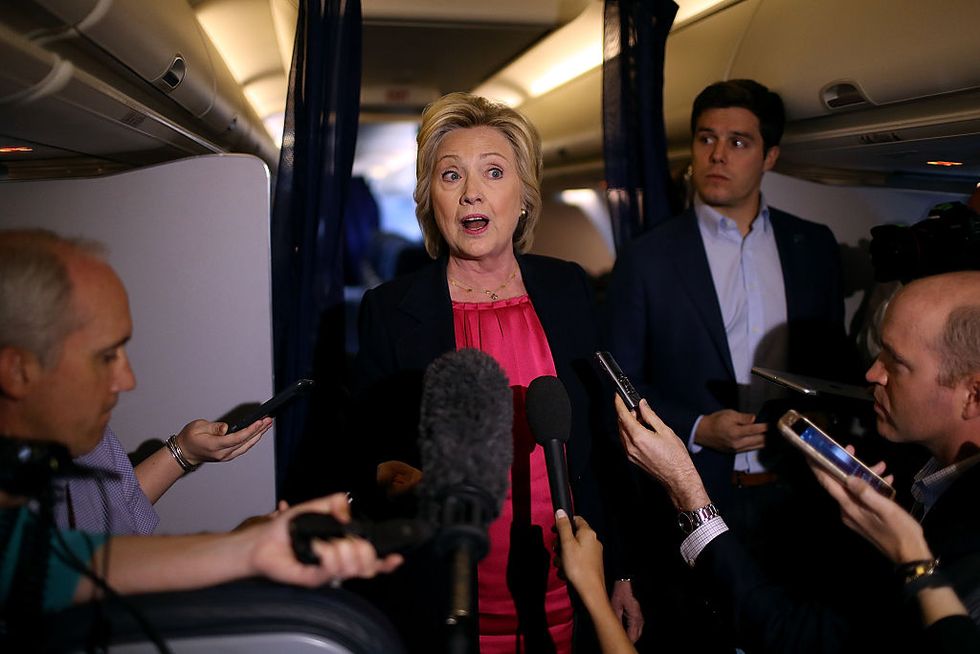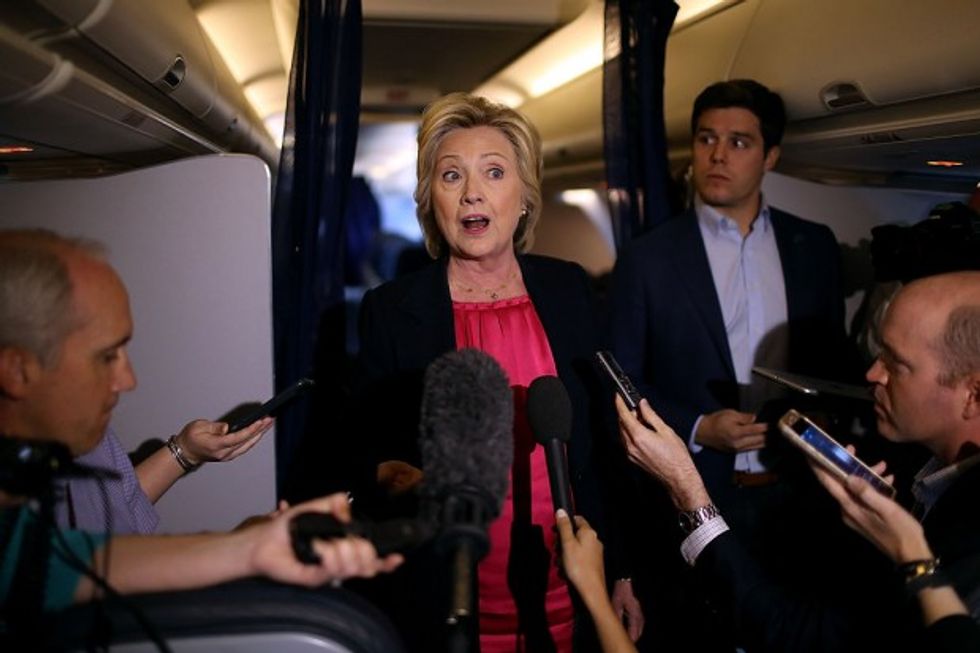
Democratic presidential nominee former Secretary of State Hillary Clinton speaks to members of the media aboard her campaign plane on September 6, 2016. (Justin Sullivan/Getty Images)

“Give me a word, any word, and I show you how the root of that word is Greek.”
That’s Gus Portokalos, the fiercely proud Greek father in the film “My Big Fat Greek Wedding” as he tries to prove to his daughter that all things lead back to Greece.
“Ok Mr. Portokalos,” one of the daughter’s friends says smugly, “How about the word ‘kimono?’”
He thinks for a minute, and then—quite proud of himself—says: “Kimono, kimono, kimono. Ha! Of course! Kimono is come from the Greek word ‘himona,’ is mean winter. So, what do you wear in the wintertime to stay warm? A robe. You see: robe, kimono. There you go!”
Hold that thought, and let’s switch to politics for a second.
I recently heard someone say that they don’t think the presidential election “really affects them one way or another.” (Yikes.)

In fairness, I think most people do understand that presidential policy does eventually trickle down to us here outside the Washington beltway bubble (after all, we do pay the resulting taxes and abide by the resulting laws), but it got me thinking: how many people realize how a person’s corruption filters down to us, too? With the onslaught of the WikiLeaks’ email dump which revealed the sleazy relationships, backroom deals, quid pro quo, and rampant hypocrisy of Hillary Clinton and her campaign—how many people wave this off as irrelevant to them? How many people disconnect it from the way she’ll govern?
Let me paraphrase Mr. Portoklos’ line of thinking here for a second: “Give me a Hillary Clinton scandal, any Hillary Clinton scandal, and I’ll show you how that scandal affects you personally.”
Let’s get started.
She’s got “public and private” positions. So what?
Ask anyone to define what Hillary Clinton stands for, and they’ll tell you she’s known for her tough talk towards big banks, big business, and millionaires; for fighting for income equality; for defending minorities; for her tough talk on Russia, as well as assuring the American people that she’s serious about border security.
At least, those are the tenants that make up the “public” Hillary Clinton.
Thanks to WikiLeaks, we’ve been given a window in what makes up the “private” Hillary Clinton: she and her campaign dream of open borders and voting privileges for illegal aliens; she only cares about so-called income inequality if she feels “pressure” to do so; she thinks of Latinos as “needy;” and wants to work together with Vladimir Putin and Russia. Oh yeah—and her 2008 campaign poll tested attacks on Barack Obama’s “possible use of cocaine and Muslim heritage.”
But so what, right? After all, as Hillary Clinton herself admitted: “Politics is like sausage being made. It is unsavory, and it always has been that way, but we usually end up where we need to be. But if everybody’s watching . . . then people get a little nervous, to say the least. So, you need both a public and a private position.”
This is what this means to you: you’re Hillary Clinton’s useful idiot. She needs to get to the White House—and she’ll use your political passion, views and beliefs to get her there. She’ll tell you what you need to hear in order to get your vote—and then proceed to do whatever most benefits her political ambitions.
She trades favors at the highest level of government. So what?
Hillary Clinton touted the wonderful work the Clinton Foundation does, claiming “90 percent of all the money that is donated on behalf of programs of people around the world and in our own country.” (For the record, it’s around six percent.)
Except what happens when the “majority of the non-governmental meetings Hillary Clinton held as U.S. secretary of State were with donors to her family's tax-free foundation”? Or that “many of the foundation’s donors had ‘an expectation of a quid pro quo benefits in return for gifts’”? Or that her State Department took “Algeria off the US terror watch list after they made a hefty donation to the Clinton Foundation’s Haiti relief project”? Or that “tens of millions in taxpayer dollars were used to build a clothing factory in Haiti for a company that has donated to the Clinton Foundation and whose owner invested in Cheryl Mills’ [former Hillary Clinton chief-of-staff] private consulting company”?
Ultimately this means she’s willing to use a charity as a front organization to launder money (and benefit her own tax situation), and she’s willing to do it all on the taxpayer’s (read: your) dime. Further still, she’s willing to pay off the FBI to cover her back when her private email server put the country in danger.
So what does that mean for you? She’s willing to abuse your hard-earned tax dollars, and put your safety at risk in order to further her political career and personal finances.
She manipulates the media. So what?
Before it became the opinion conduit it is today, actual journalism was intended to protect the American people by keeping them fully informed.
So what happens a presidential campaign colludes directly with powerful figures in the journalism world—who shift opinions and craft narratives with the stroke of a pen—to ensure their chosen leader is painted in a positive light; to ensure scandals are minimized; to ensure she’s prepared for the debates by leaking questions to her?
We then live in a world of blissful ignorance of the facts, unburdened by the need to make character decisions of our own choosing. We find that our opinions have already been carefully crafted for us by politicians and media members who fully believe they’re smarter than you are.
Here’s the thing: if you’re indifferent towards this collusion, you wind up with state-run media. And when the state is allowed to control the media, you’re allowed to think what the government thinks . . . and no more.
She thinks the Catholic Church needs to be silenced. So what?
Maybe you’re not a Christian or a Catholic; maybe you happen to agree with her campaign that the Catholic Church is a backwards “bastardization” of the faith direly in need of state-directed reform.
But just remember this: if they can come for the Catholic Church, what possesses you to think you to think that doesn’t stop there? What makes you think your personal beliefs are safe?
After all, have we not learned from her “public” and “private” positions that Hillary Clinton and her campaign have absolutely no standard besides themselves? That’s a dangerous place to be, people. If she’s willing to completely reverse her so-called positions by slamming minorities (see: “needy Latinos”) or by using the Muslim faith as a slur (see: poll testing Barack Obama’s “Muslim” background), can you honestly say you won’t be used and abused someday if it furthers her ambitions?
Still, many will brush all of this off—because it’s just a means to an end. But remember this: you’re only safe so long as you’re useful.
If you take nothing else away from this piece, let it be this: she’s willing to routinely lie to you, cheat you out of making up your own mind, steal your hard-earned tax dollars from you, and put your life in danger to further her political career. Her scandals DO affect you personally right now. What makes you think you’d be exempt from their inevitable consequences?
Mary Ramirez is a full-time writer, creator of www.afuturefree.com(a political commentary blog), and contributor to The Chris Salcedo Show (TheBlaze Radio Network, Monday-Friday from 3 to 5 p.m. ET). She can be reached at: afuturefree@aol.com; or on Twitter: @AFutureFree
–
TheBlaze contributor channel supports an open discourse on a range of views. The opinions expressed in this channel are solely those of each individual author.